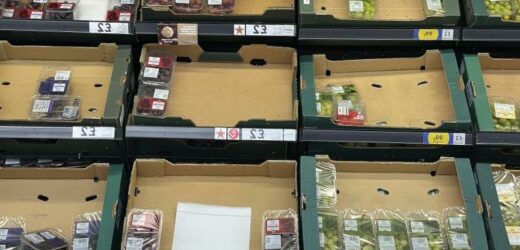Key points
- British supermarkets are facing a month-long shortage of fresh fruit and vegetables after bad weather in Southern Europe and North Africa ruined harvests.
- Several leading retailers announced they would ration a series of salad products for “a few weeks”.
- Britain traditionally relies on imports for about 90 per cent of lettuces and 95 per cent of tomatoes during winter.
- Environment Secretary Therese Coffey suggested that British families eat home-grown seasonal foods such as turnips.
London: British supermarkets are facing a month-long shortage of fresh fruit and vegetables after bad weather in Southern Europe and North Africa ruined harvests and disrupted travel routes, amid already high energy costs for farmers.
Several leading retailers announced they would ration a series of salad products for “a few weeks” after a severe frost in Morocco and Spain in November and December, which damaged a lot of the salads and brassica (cabbage) crops.
Empty fruit and vegetable shelves at a supermarket in London.Credit:AP
Environment Secretary Therese Coffey – under fire from parts of the farming sector and some of her own colleagues for the shortage -suggested on Thursday that British families eat home-grown seasonal foods such as turnips while other vegetables remained in short supply.
Britain traditionally relies on imports for about 90 per cent of lettuces and 95 per cent of tomatoes during winter. Tesco, the UK’s biggest supermarket chain and Aldi, the German-owned discounter is limiting purchases of peppers, cucumbers and tomatoes to three packs a person.
Earlier in the week Asda said it would allow customers to buy no more than three at a time from product lines including tomatoes, peppers, cucumbers, lettuce, salad bags, broccoli, cauliflower and raspberries, while Morrisons has put limits of two an item on packs of tomatoes, cucumbers, lettuce and peppers from Wednesday.
A “Max 3 units” sign is attached to empty fruit and vegetable shelves at an Asda in east London.Credit:AP
Coffey told Parliament that British consumers should “cherish” home-grown produce, but added that people wanted “a year-round choice” and supermarkets were trying to meet that demand.
“A lot of people would be eating turnips right now rather than thinking necessarily about aspects of lettuce and tomatoes and similar, but I’m conscious that consumers want a year-round choice and that is what our supermarkets, food producers and growers around the world try to satisfy,” she said.
Coffey said that it may be a month before the current shortages are resolved.
“I am led to believe by my officials, after discussion with industry and retailers, we anticipate the situation will last about another two-to-four weeks.”
Turnips in a field after being harvested.Credit:AP
The National Farmers Union has warned that cuts to post-Brexit farm subsidies, combined with steep rises in the prices of raw materials, labour and energy, were leading to production falls in other areas of agriculture, including eggs. Almost 1 billion fewer eggs were produced in 2022 than in 2019, NFU President Minette Batters said this week.
Batters told an agriculture conference this week that supplies of salad vegetables grown in UK greenhouses were falling because high energy prices were making it uneconomic for some growers to operate.
While growers of salad crops previously operated year-round, albeit at lower levels in winter, Batters called for the government to support their energy costs through its energy-intensive industries exemption scheme, from which growers are excluded.
“For protected crop growers, those growing [crops] under cover, the price of gas means that they are mothballing many of their businesses,” she said. We are seeing huge contractions — the lowest levels of production since 1985, when records began.
“Other sectors are facing an uncertain future as direct [subsidy] payments are phased out against a backdrop of high-cost inflation.”
One-in-four British shoppers have found that food they planned to buy was not available, according to a survey by the Office for National Statistics. The availability of produce is estimated to be down by between 30 per cent and 40 per cent on some crops, with the pepper harvest down 70 per cent.
Wholesale prices have shot up to three times normal levels in some cases, adding to inflation in stores and leading to empty shelves.
Get a note directly from our foreign correspondents on what’s making headlines around the world. Sign up for the weekly What in the World newsletter here.
Most Viewed in World
From our partners
Source: Read Full Article





